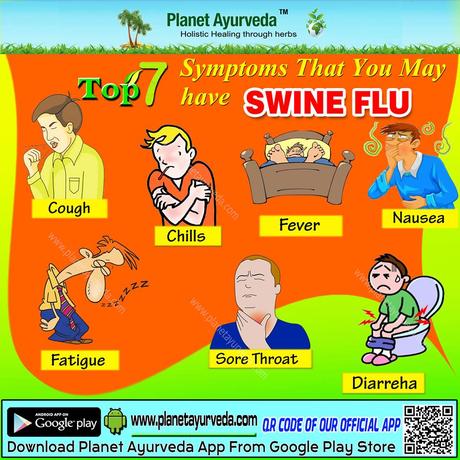Recent deaths due to swine flu and its complications created a major havoc amongst health professionals all over the world. Earlier in 2009, the similar condition was faced and in 2010, WHO declared the pandemic over. The only vaccine and medicine available for the treatment of swine flu is Tamiflu whose inconclusive results and reports by British Medical Journal has put the use of Tamiflu in pandemic under question.
Swine flu is not mentioned in classical texts of Ayurveda but the science explains the factors to be understood and followed to treat such a viral disease. The concept of Vata-Kaphaj jwara and Asthigata Jwara helps in understanding the prevention, diagnosis and management of this condition. Ayurvedic herbs for swine flu relieves throat, chest discomfort, headache, malaise, cough - which are all the H1N1 symptoms. Most of the herbs used in Ayurvedic treatment for swine flu are anti-pyretic and improve leucocyte count thus improving immunity.

What are the signs and symptoms of Swine Flu?
The most common cause of death is respiratory failure. Other leading causes of death are pneumonia (leading to sepsis), high fever (leading to neurological problems), dehydration (from excessive vomiting and diarrhoea), electrolyte imbalance and kidney failure. Fatalities are more likely in young children and the elderly.
Diagnosis.
- The CDC recommends real-time PCR as method of choice for diagnosing H1N1. Diagnosis is done by the oral or nasal fluid collection and RNA virus preserving filter paper card is commercially available. This method allows a specific diagnosis of novel influenza (H1N1) as opposed to seasonal influenza.
Drink plenty of liquids
- Choose water, juice and warm soups to prevent dehydration.
Tulsi-(Ocimum sanctum)
- Tulsi is a very common herb found in all homes in India. It has a large number of therapeutic uses. It keeps throat and lungs clear and helps in fighting infections by strengthening the immune system. Take 3-4 leaves of Tulsi every day in the morning.
Giloy (Tinospora cordifolia)
- Giloy is a wonderful herb known by the name "Amrita" in Ayurvedic texts. It is commonly found in all parts of India. Take one-foot long branch of giloy, add 5-6 leaves of Tulsi and boil in water for 15-20 minutes to allow the water to extract its properties. Take this 1 cup warm water twice a day. This mixture will enhance the immunity of an individual.
Turmeric (Curcuma longa)
- Turmeric is anti-inflammatory, anti-antioxidant and anti-biotic in nature. Take a warm glass of milk with some turmeric added to it.
Ginger and Amla
- Ginger and Amla are powerful herbs with many health benefits mainly targeting respiratory system. Take 1 teaspoon amla powder, 1 teaspoon long pepper powder (pippali), 1 teaspoon ginger powder and 1 teaspoon sugar powder. Make a uniform mixture of amla, long pepper and ginger powder. This powder must be taken with a little sugar or with honey. This remedy is quite useful in chronic cough associated with swine flu. The dosage can be ½-1 gram and can be repeated upto 3 to 4 times a day depending on the condition.
Pippali (Long Pepper)
- It is the herb of choice for all respiratory tract infections. It acts as a mucolytic which breaks down the mucous inside the lungs and widens the constricted small long pipes. Mixture of a pinch of black pepper powder with ½-1 teaspoon of honey twice a day is recommended.
Ginger
- Ginger is a good broncho-dilator. Ginger juice mixed with honey is a good combination useful for improving lung functions. It also possesses powerful anti-oxidant activity.
Amla (Indian gooseberry)
- Amla is rich in Vitamin C which is quite useful in boosting the body's defence against infections. Take gooseberry's juice with sugar or honey twice a day.
Preventive Measures
- Stay home if you are sick - If you are suffering from Swine Flu (H1N1 flu), others can get infection from you. Stay home for at least 24 hours after your fever is gone.
- Cover your mouth and nose when you sneeze or cough.
- Avoid Contact - Stay away from crowds if possible.
- Wash hands frequently and thoroughly - Use soap and water or if they are unavailable, use an alcohol based sanitiser.

